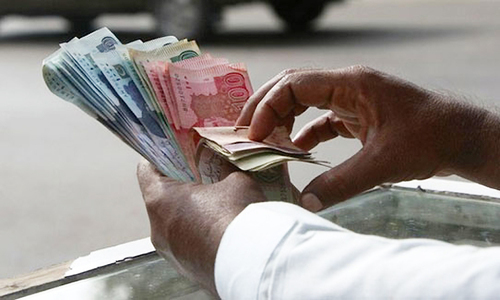ISLAMABAD: With increasing fiscal deficit and revenue shortfall, the government is keeping the Public Sector Development Programme (PSDP) under tight control as evident from total spending of Rs373 billion so far or 55 per cent of revised target of Rs675bn.
The Ministry of Planning and Development on Friday said it had released Rs373bn as of March 22 for PSDP against Rs565bn of almost same period (March 16) of last year, showing a reduction of almost 34pc.
The government is anticipating its fiscal deficit to cross 6.3pc of GDP (gross domestic product) during the current fiscal year – missing by wide margin its revised target of 5.1pc set in September last year.
According to PSDP implementation plan, the government should have released more than 65pc funds of the annual allocation by now. Under disbursement mechanism put in place in consultation with the finance ministry, 20pc allocated funds are required to be released in each of the first two quarters and 30pc each in the third and fourth quarters of the financial year. That should mean the total releases should be 70pc in first three quarters of the fiscal year ending March 31.
Fund releases drop 34pc to Rs373bn in almost nine months
The data suggested that about Rs154bn has been released by the Planning Commission to all the 39 federal ministries and divisions as of March 22 this year. This worked out at 52.7pc of Rs291.5bn annual allocation for these ministries. In comparison, Rs135bn had been released to these ministries the same period last year, accounting for 45pc of revised allocation of Rs302bn.
The data showed the Planning Commission could not release any funds for development of Federally Administered Tribal Areas (Fata) even though an allocation of Rs10bn had been approved in the supplementary budget presented by the PTI government in September, 2018 as federal contribution to 10-year development programme of the region now merged as districts of the Khyber Pakhtunkhwa. Last year, the government had released about Rs16.9bn for states and tribal regions about nine months against an annual allocation of Rs26.9bn.
Also, the government did not spend even a penny on special programmes so far for which the PTI government had made an allocation of Rs27bn including a block allocation of Rs24bn for expected special initiatives under CPEC. These funds now stand transferred to parliamentarian’s schemes without any utilisation so far.
Releases to Azad Jammu & Kashmir have been significantly lower this year. For example, the Planning Commission released Rs17.6bn so far to AJK against a total allocation of Rs25.8bn. During the same period last year, Rs22bn was provided to AJK against the same allocation of Rs25.8bn.
Likewise, GB was provided with Rs15bn this year against an allocation of Rs17.5bn compared to Rs15bn last year out of Rs18.3bn allocation.
In contrast, the releases out of federal budget to corporations as percentage of total allocations were higher this year, mainly because of near completion of most of the projects that have been under implementation for a few years, majority of them under the China-Pakistan Economic Corridor. In absolute terms, the releases for NHA and Power companies had been significantly lower this year.
This is evident from the fact that the commission released a total of Rs170bn to two leading corporations – National Highway Authority and the power sector – accounting for about 78pc against revised allocations of Rs218.6bn.
In comparison, an amount of Rs238bn had been released to these two sectors during the same period of last year when 62pc of revised allocation of Rs385bn.
The total core PSDP releases under the Planning Division stood at Rs356bn so far against a revised annual target of Rs597bn, accounting for almost 60pc. During the same period last year, the core PSDP had consumed about Rs500bn until March 16 against revised allocation of Rs866bn, about 58pc.
On the other hand, the government could release only Rs17.7bn (just 23pc) to three special programmes under the control of Ministry of Finance against a total allocation of Rs78bn. These allocations included Rs33.5bn each for development for settlement of internally displaced persons and security enhancement, Rs7bn for Prime Minister’s Youth Programme and Rs4bn for gas infrastructure development. During the same period last year, an amount of Rs45bn was released to these sectors against a total allocation of Rs135bn.
According to fresh estimates of fiscal operations finalised by the finance ministry, the fiscal deficit has been worked out to go beyond Rs2.4 trillion in absolute terms against Rs1.98tr target fixed as part of the supplementary budget 2018-19. The deficit was originally fixed at 4.9pc of GDP (Rs1.89tr) by the PML-N government for the current year.
Published in Dawn, March 23rd, 2019













































